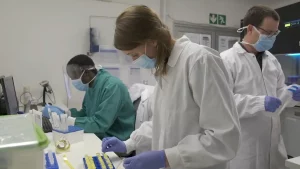
Emergence of New COVID-19 Variants

The emergence of new COVID-19 variants has become a significant concern for public health officials worldwide. These variants exhibit increased transmissibility, making them more contagious than the original strain of the virus. As a result, they have the potential to spread more rapidly within communities, leading to higher infection rates and increased strain on healthcare systems. The mutations in these variants often occur in the spike protein, which is the part of the virus that binds to human cells, facilitating its entry and subsequent replication. Consequently, these changes can enhance the virus’s ability to infect individuals and propagate more swiftly.
Moreover, the impact of COVID-19 variants on vaccine efficacy is a critical area of investigation. Current vaccines were developed based on the original strain of SARS-CoV-2, and while they have proven effective in preventing severe illness and death, the emergence of new variants poses challenges. Some variants have shown the ability to partially evade the immune response generated by existing vaccines, potentially reducing their effectiveness. This phenomenon, known as immune escape, underscores the need for continuous monitoring and adaptation of vaccine formulations to ensure they remain effective against evolving strains.
Impact on Vaccine Efficacy
New COVID-19 variants may reduce vaccine effectiveness, which is a pressing concern for public health authorities and the scientific community. The mutations in these variants can alter the virus’s structure, making it less recognizable to the immune system primed by the original vaccine. This can lead to a decrease in the vaccine’s ability to prevent infection, although it may still offer protection against severe disease and hospitalization. To address this issue, researchers are conducting studies to assess the extent of vaccine efficacy reduction and to develop updated vaccines that can provide broader protection against multiple variants.
Monitoring COVID-19 variants is crucial for vaccine updates. Continuous surveillance of circulating variants allows scientists to identify significant mutations and assess their impact on vaccine performance. By tracking the genetic changes in the virus, researchers can anticipate potential challenges and develop strategies to counteract them. This proactive approach is essential for maintaining the effectiveness of vaccination campaigns and ensuring that populations remain protected against emerging threats.
Transmission Rates and Patterns
Transmission rates of new COVID-19 variants are notably higher compared to earlier strains. The increased transmissibility can be attributed to mutations that enhance the virus’s ability to bind to human cells or replicate more efficiently. As a result, these variants can spread more quickly within communities, leading to larger outbreaks and increased pressure on healthcare systems. The rapid transmission also heightens the risk of the virus reaching vulnerable populations, such as the elderly or those with underlying health conditions, who are at greater risk of severe illness.
Patterns of COVID-19 variants exhibit unique transmission characteristics that differentiate them from the original strain. For instance, some variants may have a higher secondary attack rate, meaning that they are more likely to be transmitted from one person to another within a household or close-contact setting. Additionally, certain variants may show increased resistance to neutralizing antibodies, which can affect the overall transmission dynamics. Understanding these patterns is essential for developing targeted public health interventions and mitigating the spread of the virus.
Global Health Implications

Emerging COVID-19 variants pose global health risks that extend beyond national borders. The interconnected nature of the world means that a variant identified in one region can quickly spread to others, leading to widespread outbreaks. This global dissemination underscores the importance of international cooperation and information sharing to effectively manage and contain the spread of new variants. The presence of highly transmissible variants can also exacerbate existing health disparities, as countries with limited resources may struggle to implement effective control measures and vaccination campaigns.
New COVID-19 variants challenge vaccine efficacy worldwide, necessitating a coordinated global response. The potential for variants to reduce vaccine effectiveness highlights the need for continuous adaptation of vaccination strategies. This includes the development of booster doses or updated vaccines that can provide protection against multiple variants. Additionally, global health organizations must work together to ensure equitable access to vaccines, particularly in low- and middle-income countries, to prevent the emergence and spread of new variants.
Government Response Strategies
Implementing rapid testing for new COVID-19 variants detection is a critical component of government response strategies. Rapid and accurate testing allows for the timely identification of variants, enabling public health authorities to implement targeted interventions to contain their spread. This includes measures such as contact tracing, isolation of infected individuals, and quarantine of exposed contacts. Rapid testing also provides valuable data for monitoring the prevalence and geographic distribution of variants, informing public health decision-making.
Enhancing genomic surveillance to track COVID-19 variants spread is another essential strategy. Genomic surveillance involves sequencing the genetic material of the virus from positive test samples to identify mutations and track the evolution of variants. This information is crucial for understanding the epidemiology of the virus and assessing the impact of variants on public health. Governments must invest in genomic sequencing infrastructure and collaborate with international partners to share data and insights, ensuring a comprehensive and coordinated response to emerging variants.
Public Health Recommendations
Monitoring and reporting new COVID-19 variants promptly is vital for effective public health management. Timely identification and dissemination of information about new variants enable public health authorities to implement appropriate control measures and inform the public about potential risks. This includes updating guidelines for testing, treatment, and vaccination, as well as communicating the importance of continued adherence to preventive measures such as mask-wearing and social distancing.
Updating vaccination strategies for emerging COVID-19 variants is essential to maintain population immunity. This may involve the development and deployment of booster doses or updated vaccines that target specific variants. Public health authorities must also prioritize vaccination efforts for vulnerable populations and areas with high transmission rates. Additionally, ongoing public education campaigns are necessary to address vaccine hesitancy and ensure widespread acceptance and uptake of updated vaccines.
Future Research Directions
Monitoring emerging COVID-19 variants for vaccine efficacy is a key area of future research. Scientists must continuously evaluate the performance of existing vaccines against new variants to identify any potential reductions in efficacy. This involves conducting laboratory studies, clinical trials, and real-world observational studies to gather comprehensive data on vaccine effectiveness. The findings from this research will inform the development of updated vaccines and booster doses, ensuring that vaccination efforts remain effective in the face of evolving variants.
Genomic sequencing to track new COVID-19 variants is another critical research direction. By analyzing the genetic sequences of the virus, researchers can identify mutations and track the spread of variants over time. This information is essential for understanding the evolutionary dynamics of the virus and predicting future trends. Genomic sequencing also provides valuable insights into the mechanisms of immune escape and transmissibility, guiding the development of targeted interventions and informing public health strategies.
Conclusion:
In conclusion, the emergence of new COVID-19 variants presents significant challenges for global health, vaccine efficacy, and public health management. Continuous monitoring, rapid testing, and genomic surveillance are essential for detecting and responding to these variants. Governments and public health authorities must adapt their strategies to address the evolving threat, ensuring that vaccination efforts remain effective and that populations are protected against emerging variants. Ongoing research and international collaboration will be crucial in navigating the complexities of the COVID-19 pandemic and safeguarding public health.










